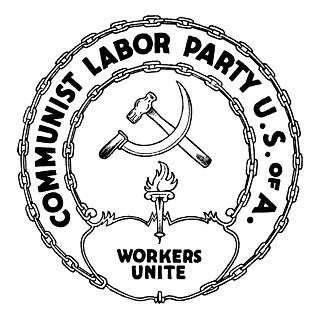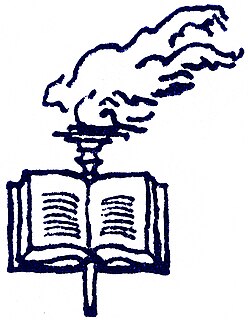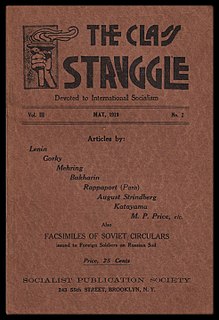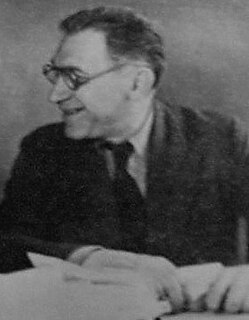
The Communist International (Comintern), also known as the Third International, was an international organization founded in 1919 that advocated world communism, controlled by the Soviet Union. The Comintern resolved at its Second Congress to "struggle by all available means, including armed force, for the overthrow of the international bourgeoisie and the creation of an international Soviet republic as a transition stage to the complete abolition of the state". The Comintern was preceded by the 1916 dissolution of the Second International.

The Communist Labor Party of America (CLPA) was one of the organizational predecessors of the Communist Party USA.

The Proletarian Party of America (PPA) was a small communist political party in the United States, originating in 1920 and terminated in 1971. Originally an offshoot of the Communist Party of America, the group maintained an independent existence for over five decades. It is best remembered for carrying forward Charles H. Kerr & Co., the oldest publisher of Marxist books in America.

William F. "Bill" Kruse (1894–1979) was an important head of the Young People's Socialist League (YPSL) in the 1910s. He was a member of the Socialist Party of America until 1921, acting as a leader of the party's Left Wing faction, loyal to the Third International (Comintern). Thereafter he joined the Workers Party of America, serving as Assistant Executive Secretary of the WPA from the time of its foundation in December 1921.

John Louis Engdahl was an American socialist journalist and newspaper editor. One of the leading journalists of the Socialist Party of America, Engdahl joined the Communist movement in 1921 and continued to employ his talents in that organization as the first editor of The Daily Worker. Engdahl was also a key leader of the International Red Aid (MOPR) organization based in Moscow, where he died in 1932.

The Left Wing Section of the Socialist Party was an organized faction within the Socialist Party of America in 1919 which served as the core of the dual communist parties which emerged in the fall of that year—the Communist Party of America and the Communist Labor Party of America.

Herbert Moore "Harry" Wicks (1889–1956), best known as "Harry M. Wicks," was an American radical journalist and politician who was a founding member of the Communist Party of America. He was a plenipotentiary representative of the Communist International to Australia in 1930-31 and there directed the reorganization of the structure and leadership of the Communist Party of Australia.
Morgen Freiheit was a New York City-based daily Yiddish language newspaper affiliated with the Communist Party, USA, founded by Moissaye Olgin in 1922. After the end of World War II the paper's pro-Israel views brought it into disfavor with the Communist Party and its editor Paul Novick was expelled from the organization. The paper closed in 1988.
The Finnish Socialist Federation was a language federation of the Socialist Party of America which united Finnish language-speaking immigrants in the United States in a national organization designed to conduct propaganda and education for socialism among their community.

Moissaye Joseph Olgin (1878–1939) was a Ukrainian-born writer, journalist, and translator in the early 20th century. He began his career writing for the Jewish press in support of the Russian Revolution in 1910. During the First World War, he moved to the United States in 1915, settling in New York City, where he continued his career in journalism. Much of his work was in support of communism, and he was a founding member of the Workers Party. In 1922, he founded The Morning Freiheit, and served as its editor until his death in 1939.

Maximilian "Max" Cohen was an American socialist politician of the early 20th Century. Cohen held a series of important posts during the pivotal year of 1919, including Secretary of the Left Wing Section of the Socialist Party for Local Greater New York, Secretary of the Left Wing National Council, and business manager for the New York Communist. Cohen was also a founding member of the Communist Party of America in that same year.

The Jewish Socialist Federation (JSF) was a secular Jewish Yiddish-oriented organization founded in 1912 which acted as a language federation in the Socialist Party of America (SPA). Many of the founding members of the JSF had previously been members of the Bund in Eastern Europe and sought to bring Bundist politics to the socialist movement in the USA.
The United Toilers of America, established in 1922, was the legal wing of an underground Marxist group which split off from the Communist Party of America in the fall of 1921. The organization published a weekly newspaper called Workers' Challenge and was effectively dissolved at the insistence of the Communist International by the time of the Bridgman Convention of August 1922 with its members rejoining the mainline Workers Party of America. A tiny underground rump organization resisted merger and continued an independent existence throughout the decade of the 1920s.
Alexander "Alex" Bittelman (1890–1982) was a Russian-born Jewish-American communist political activist, Marxist theorist, influential theoretician of the Communist Party USA and writer. A founding member, Bittelman is best remembered as the chief factional lieutenant of William Z. Foster and as a longtime editor of The Communist, its monthly magazine.
Melech Epstein (1889–1979) was an American journalist and historian. His two most famous books, Jewish labor in U.S.A. and The Jew and communism are considered standard works.

Dennis E. Batt was an American political journalist and trade union activist. Best remembered as the first editor of The Communist, the official organ of the Communist Party of America and leading member of the Proletarian Party of America, in later years Batt's political views became increasingly conservative and he ended his life as a mainstream functionary in the union movement.

The 1922 Bridgman Convention was a secret conclave of the underground Communist Party of America (CPA) held in August 1922 near the small town of Bridgman, Michigan, about 90 miles (140 km) outside of the city of Chicago on the banks of Lake Michigan. The convention, called by the CPA as its annual gathering for the election of officers and making of internal decisions, was attended by a delegate who was secretly an employee of the Bureau of Investigation, who informed his superiors of the date and general location of the gathering. The convention was raided by local and federal law enforcement authorities on August 22, 1922, and a number of participants and a large quantity of documents seized in an operation which garnered national headlines. Two 1923 test trials of the Michigan criminal syndicalism law resulted from the arrests, with trade union leader William Z. Foster freed by a "hung jury," while Communist Party leader C. E. Ruthenberg was convicted. Ruthenberg ultimately died of peritonitis in 1927, just after his appeals were exhausted and just before sentence was enforced. No additional trials associated with the 1922 Bridgman raid were conducted.
John J. "Johnny" Ballam was an American Marxist political activist and trade union organizer. He is best remembered as a founding member and one of the pioneer leaders of the Communist Party of America and as a leader of the Trade Union Unity League in the textile industry during the 1930s.

J. B. S. Hardman, born Jacob Benjamin Salutsky, (1882-1968) was a Russian-born American political activist, radical journalist, and trade union functionary. Salutsky-Hardman was a proponent of radicalism as a Marxist thinker and a leader of the Jewish Socialist Federation of the Socialist Party of America (SPA). A brief stint in the American Communist movement ended in his expulsion in 1923.
Nathaniel Buchwald (1890–1956) was a 20th-century, left-leaning Jewish-American theater critic, writer, and scholar of Yiddish theater who wrote in Yiddish and English and translated from Yiddish and Russian into English.












